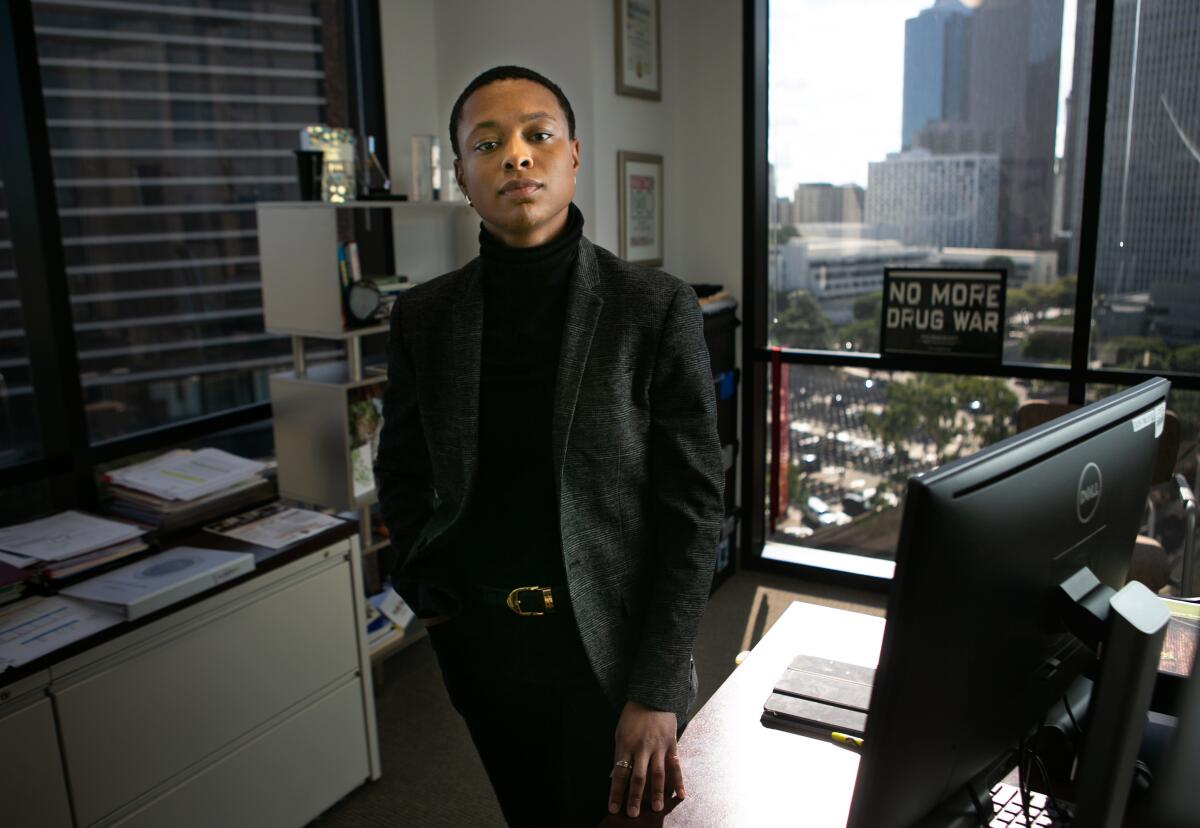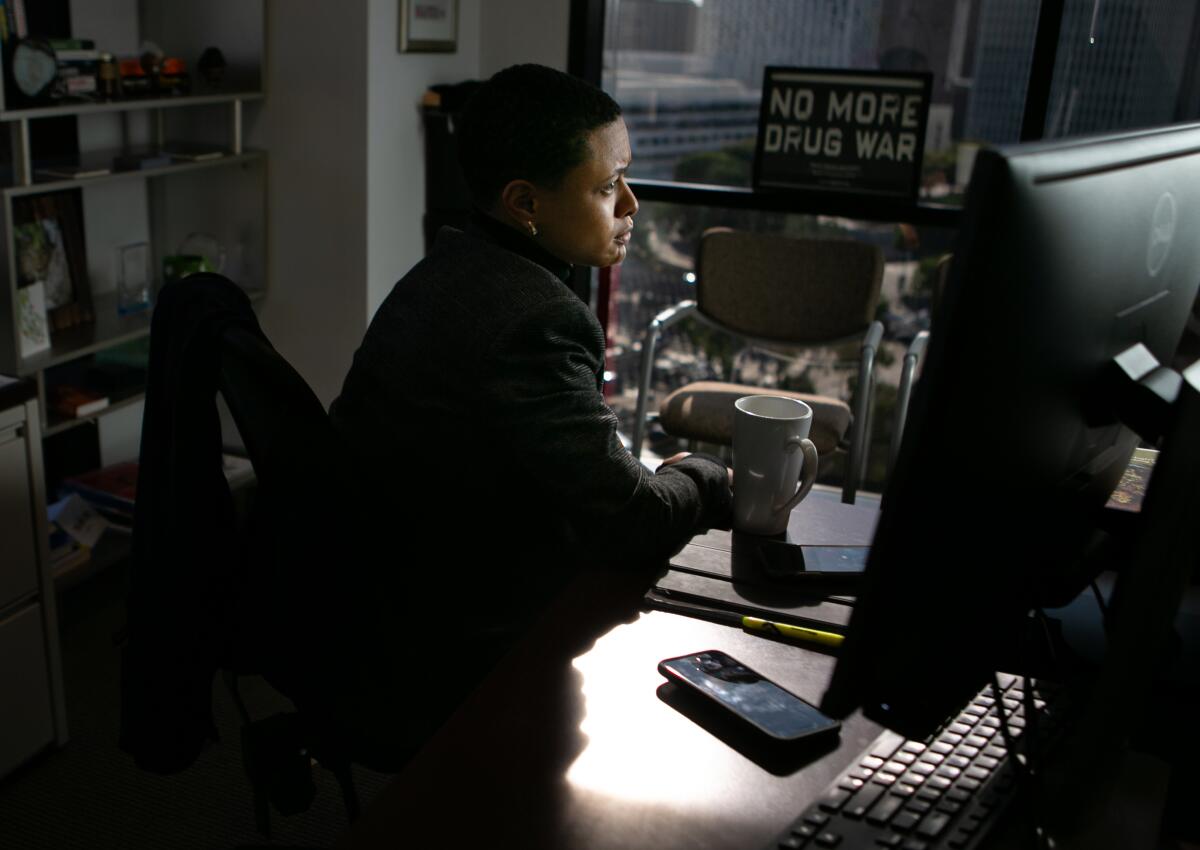She embodied the hopes for L.A.’s cannabis program. Can she overcome its stumbles?

When Cat Packer was chosen to head a Los Angeles city department that would help usher in the legalization of marijuana, then-Council President Herb Wesson billed her appointment as a bold example of what Los Angeles stood for.
Packer had been an activist with the Drug Policy Alliance who was firmly focused on how the war on drugs had battered communities of color. She was young, black and openly gay, with tailored suits, hair cut in a fade, and the cool, deliberate speech of a lawyer, and she had wowed Wesson at City Hall when she laid out statistics about racial inequity.
The Department of Cannabis Regulation, her new agency, was not just going to hand out permits for pot shops. It was supposed to do something much more ambitious and radical: Ensure that the communities hit hardest by the criminalization of marijuana would benefit from its legalization. Many saw the effort as a kind of reparations for the drug war.
Two years later, Packer would face a furious and disappointed crowd of cannabis applicants and activists in the marble chambers of City Hall and tell them that she was disappointed too. That the city had ended up hurting hundreds of people who took financial risks as they tried to nab a limited number of licenses. That she routinely told other cities not to do what L.A. did.

If Packer had once seemed to personify L.A.’s progressive vision for cannabis, she was now the public face of its stumbles in realizing that goal. Licensing for new shops had been put on hold. Wesson and Mayor Eric Garcetti had called for an audit. Packer was being berated by cannabis activists at public meetings and facing threats in her inbox.
“It’s one thing to pass an equitable policy,” she told the crowd of applicants and activists. “It’s another thing in its entirety for it to be implemented.”
**
Cat was not the name she was given when she was born in Germany, a military kid who was shuttled to Virginia, Arizona and Virginia again. Her mother still calls her “Rina,” a shortening of the German version of her name.
As a young teen, she turned to the police department to report being sexually assaulted by an officer, but the charges were ultimately dropped for insufficient evidence. Packer said that friends of the officer were involved in the investigation and even her attorney said it would be her word against his. It was an early experience, she said, of feeling let down by those in power.
“That’s part of what led me to want to be an attorney,” Packer said. “I knew that I did not have to make the same decisions that they made.”
After reporting the assault, Packer left Virginia to join her father in Ohio, where she would go on to college, grad school and law school at Ohio State University. She had envisioned herself fighting for marriage equality when she took a course on marijuana policy while reading Michelle Alexander’s “The New Jim Crow: Mass Incarceration in the Age of Colorblindness.”
The words in one passage rang in her head: “Nothing has contributed more to the systematic mass incarceration of people of color in the United States than the war on drugs.” Yet her privileged classmates casually smoked pot, and cannabis was already becoming a legal business in some states.
“Part of what was so astonishing to me,” Packer said, “was how easy it was for us to shift public policy when there was profit as a motive.” In Ohio, an initiative to legalize a limited number of marijuana growers was headed for the ballot, a proposal criticized by some activists as setting up a monopoly.
Packer recalled sparring with a campaign official when he visited her class, pointing out to him that “this initiative wasn’t going to do anything for people of color.” When her professor, Doug Berman, stopped her after class and urged her to go to work for the campaign once she graduated, Packer said she asked, “Why?”
“Her seriousness of purpose was evident from the get-go,” Berman recalled of his former student. He argued that, despite the shortcomings that Packer had pinpointed, the campaign would teach her things she couldn’t learn in a classroom.
“She could have reacted by saying, ‘These folks are never going to get it,’” Berman said. Instead, she joined the campaign as its assistant director of internal communications — a position she said amounted to doing just about everything.
The Ohio initiative ultimately failed. Packer had gotten back into grass-roots organizing in Ohio when she saw that the Drug Policy Alliance, a group seeking to reduce criminalization in drug policy, was hosting a strategy session in New York called “Drug Policy Reform Is Racial Justice Reform.” She hitched a Megabus east with a file folder loaded with business cards and copies of her resume.
The bus broke down, but she was still the first person to arrive at the conference. Lynne Lyman, the former California state director of the Drug Policy Alliance, said she immediately knew that Packer was the person who would help her secure passage of Proposition 64 — the 2016 measure to legalize recreational pot — and swiftly hired her as campaign coordinator.
In her new job, Packer soon began reaching out to cities about local programs to ensure “social equity.” Just months after Packer had moved to Los Angeles, she went to City Hall to urge L.A. to put equity at the forefront of its cannabis regulations, recounting statistics about black people being disproportionately arrested on marijuana charges.
When she stopped talking, Wesson piped up from his seat, “Hey, Cat, do you have a resume? You just impress the hell out of me. Send one to me, please.”

***
When Packer was chosen to head the Department of Cannabis Regulation, many were elated. Kika Keith, a South L.A. resident who wants to open a shop selling cannabis-infused beverages, said it was the same kind of hope she once had about another young, vibrant black leader — Barack Obama — and that it had ended in the same disappointment.
“I still have love for her. I think she’s a brilliant person,” Keith said. “But she failed us.”
Packer said she should have done a better job at managing expectations about a program that would never provide licenses for everyone who wanted them and that moved slower than they had hoped. But many of the problems now roiling the department were rooted in decisions made years earlier, she said, some before she was even appointed.
Under rules approved by the City Council, the Department of Cannabis Regulation had to first grant approval to existing shops that had followed city rules, then the growers and manufacturers who had supplied them, before it could start licensing new operators like Keith.
It was a huge task for a fledgling department with only a handful of employees in January 2018. “No one could have done what they were asking her to do,” said Adam Spiker, executive director of the cannabis industry group Southern California Coalition.
As the department struggled to get through the paperwork for hundreds of businesses, more than a year and a half passed before it was ready to start licensing new shops under its social equity program, which was meant to help those hit hardest by the war on drugs. Many of those entrepreneurs, eager to grab coveted storefronts, were already forking over steep rents.
Amid pleas for the city to get moving, Wesson moved to set a hard deadline for the next round of licensing. L.A. ended up moving forward with the process before it had set up most of its programs to help train and guide applicants in its social equity program, which is meant to help people from communities disproportionately affected by marijuana criminalization. That decision, Packer later said, left those entrepreneurs vulnerable to “predatory practices” from corporate investors and landlords
“If the city and Herb Wesson were serious about social equity, they would have funded it first,” Lyman said, pointing out that the bulk of the funding for the program was not provided until midway through 2019. “Instead they pressured her to give out licenses without a program being developed.”
Packer had also raised concerns about another fateful decision: Council members decided that a limited number of licenses for new shops would be handed out on a first-come, first-served basis, in what Spiker later called a “fastest computer contest.” L.A. was flooded with hundreds of applications in minutes, far exceeding the available licenses.
In October, after activists released a video showing someone accessing the system early, Packer publicly stated that two people had gotten in minutes early after resetting passwords but were pushed back in line to where they would have been if they’d started right on time. But a top aide to Wesson privately told an applicant that more people had gotten in early.
“You gotta be completely transparent about what happened. You can’t omit information, right?” Andrew Westall said on a video of that discussion, recorded without his knowledge. “Because as my wife always tells me, it’s still lying if you don’t tell me.”
In December, days before parts of that video were released, the department confirmed the system had opened a little early and a dozen more people had gotten in seconds before the 10 a.m. start time. City officials said those applicants also were bumped back, but Keith and other applicants felt that Packer had lied to them.
“There’s no trust there,” said Virgil Grant, a cannabis industry leader who had pushed for the social equity program. “They were covering up when they should have been honest.”
Packer said when she spoke in October, department officials saw “early access” as people getting into the system before it was activated, not before 10 a.m. Still, “I wish that I could have communicated and would have communicated things better,” she said.
Local activists have also questioned whether L.A.’s program will ultimately help people of color, whose communities bore the brunt of the drug war. Grant has repeatedly drawn attention to the number of likely licensees with Armenian surnames.
The program does not single out anyone by race and cannot do so under California law. It is aimed at poor people with marijuana arrests, as well as people who have lived in areas heavily affected by such arrests.
Packer pointed out that researchers had pinpointed the policing districts where marijuana arrests were especially steep, but the council based its program on ZIP Codes — a decision that ended up looping in areas such as Los Feliz, where arrests weren’t as common. If cities want to target black and brown communities, Packer said, “we have to be surgical with our approach.”
**
One of the enduring concerns among activists is whether Packer was vocal enough about such concerns as the council hammered out and tweaked its rules. “She should have pushed back,” Grant said. “Don’t explain to the council after the fact.”
Packer said she preferred to advocate privately with council members and to mobilize community members to push publicly for needed changes. When her department was short on staff, for instance, cannabis activists turned up at City Hall to prod the council for more resources. Many blame city leaders for not equipping her department properly.
“They definitely set her up to fail,” said Luis Rivera, who once worked for Mayor Eric Garcetti and now heads a nonprofit that assists social equity applicants. But he argued that Packer could have been more forceful in insisting that the city have assistance programs up and running before new shops could apply.
Wesson and other officials picked “a token person they felt they could work with” because of her inexperience at City Hall, Rivera said. Lyman likewise said that because Packer “was young and didn’t have any political connections of her own, City Council felt like they could push her around.”
Wesson has declined to be interviewed about Packer while the audit of the application process requested by Garcetti is pending. When the video of Westall came out, a Wesson spokesman said their office had “met with concerned applicants in confidence to hear their grievances and assure them we will do everything possible to restore trust and integrity to the application process.”
Outraged applicants have flocked to City Hall, denouncing the process as tainted. At the last meeting of the Cannabis Regulation Commission, industry activist Donnie Anderson declared that if nothing was fixed, “it’s gonna be 1992 all over again” — an allusion to the violence that roiled South L.A. after officers were acquitted in the beating of Rodney King.
Spiker, of the Southern California Coalition, said the city was bad at managing expectations about the program but so were cannabis consultants who led people to bank on getting a license. In the face of overwhelming demand, “you had a minute chance,” Spiker said. “Was anyone talking about that? No.”
For Packer, the pressures of the job are compounded by the historic nature of her appointment. She said her impeccable suits are, in part, a rejoinder to the college advisor at Ohio State who insisted Packer would have to wear skirts in the workplace.
It’s also a form of professional armor as a millennial queer woman of color.
“I’m trying to be my truest self in ways that are going to be advantageous for the communities that I serve,” she said. The concern is that “if I do something that’s too radical, they’re not letting any more young people in here, they’re not letting any more queer people in here, they’re not letting any more black people in here, and the women gotta watch out.”
But Packer doesn’t regret taking the job. “We have to be willing to take on the tough jobs,” she said. “There’s no substitute for the work. We can pontificate all we want. But someone has to do the work.”
More to Read
Sign up for Essential California
The most important California stories and recommendations in your inbox every morning.
You may occasionally receive promotional content from the Los Angeles Times.











